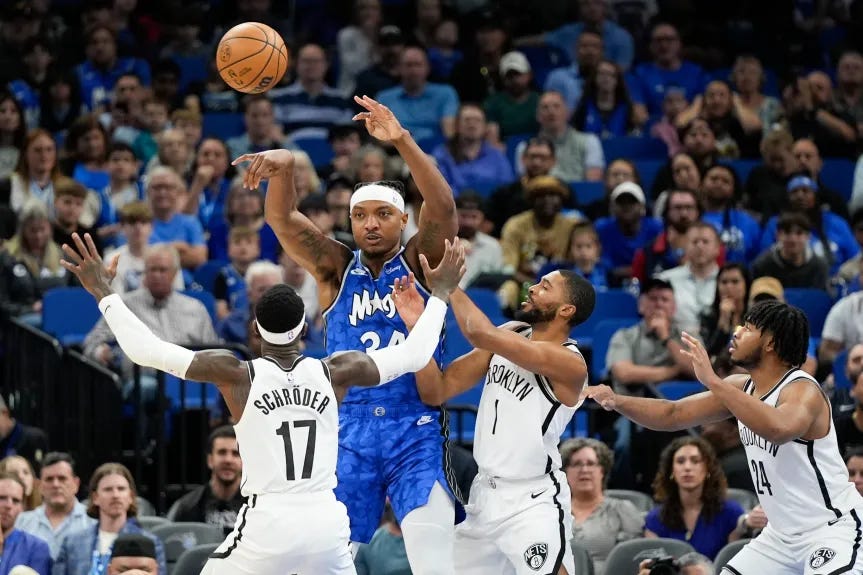Frontrunning Nets’ Efforts Disappear With Early Barrage Of Bricks Against Magic
Ahead of the start of Wednesday night’s third quarter of the Nets’ 114-106 defeat in Orlando, YES Network broadcasters Ian Eagle and analyst Sarah Kustok were bemoaning Brooklyn’s inconsistency.
Responding to an astute Eagle observation (is there any other kind from the GOAT?), Kustok summed up this Nets season perfectly. “You can’t allow missing shots to affect that spirit and (intense) mentality,” she said.
Except that’s exactly who the Nets have been all season—replacing Head Coach Jacque Vaughn with Kevin Ollie changed nothing. The Nets are the prototypical frontrunners.
In fact, since December 27, they’ve been the NBA’s biggest frontrunners. When the buckets are flowing, everything else tends to fall into place. They pick up their defense, get after 50/50 balls, and generally avoid dumb plays like technical fouls. The converse is also apparent—you can feel the team collectively sag after a series of bricks. They neglect to do all the little things that win games, like sprint back to pick up their defensive assignments or box out. No team has a greater disparity in three-point percentage between wins and losses in that span, per NBA.com.
In simpler terms, the Nets only seem to play hard when they’re shooting lights out. And since they’re more often not as talented as their competition, those nights have been few and far between. They just can’t afford to lose these effort battles, yet that’s been a common theme in this nightmare of a season.
Take Brooklyn’s last two games, an upset victory in Cleveland on Sunday and Wednesday’s sporadic performance. It seemed everything the Nets threw at the rim during Sunday’s second half went down—they shot 62.5% from the floor, including 59% on three-pointers (they were 8-of-10 from deep in the third quarter, when even 30-foot heaves were dropping).
In Ollie’s press conference after that game, he exalted his team’s physicality and communication against a Cavs team that has beaten Boston, Minnesota, and New Orleans with their superstar Donovan Mitchell out of the lineup. It was a solid win, one of several that had Nets fans hoping their team finally found a sustainable formula.
Unfortunately, it was once again a short-lived tease. Brooklyn opened the game in Orlando by missing all nine of their three-pointers in falling behind, 33-16, after one quarter. The Magic concocted any shot they desired, often by simply driving straight past or through Brooklyn’s meek defenders who offered little resistance on the perimeter and in the paint.
The Nets didn’t help matters by their failures to match up properly, which is even more problematic when they started two small guards in Dennis Schroder and Cam Thomas, who was targeted for blow-bys all evening. What was Thomas doing guarding rising Magic star Paolo Banchero on so many possessions before any screens were set?
As is the case in almost every NBA game, the Nets did play pockets of good basketball that resulted in a few mini-runs. However, the closest they got to the Magic in the second half was one six-point deficit. Orlando would then turn up the heat and the Nets wilted.
That’s how the lion’s share of these games have gone. No wonder they’ve dropped 25 of them to fall five games behind Atlanta in the loss column for the 10th and final play-in seed.
Thanks to such sporadic efforts, the Nets pretty much have had to blow no-show teams out in order to have any chance at a victory. Guess how many close games (defined by NBA.com as games that were within a five-point margin during the last five minutes) they have won since December 27? Two—against Houston on January 27 and Philadelphia on March 5. Only ten other contests reached that stage—the total of 12 clutch games is tied for the second fewest in the league in this stretch.
Soon enough, the games will officially no longer matter and the Nets can go from frontrunners to bystanders.



